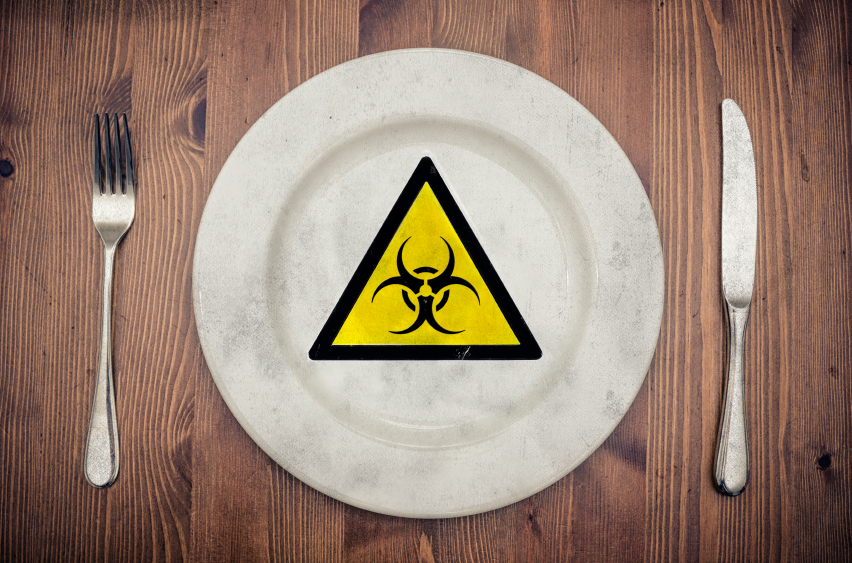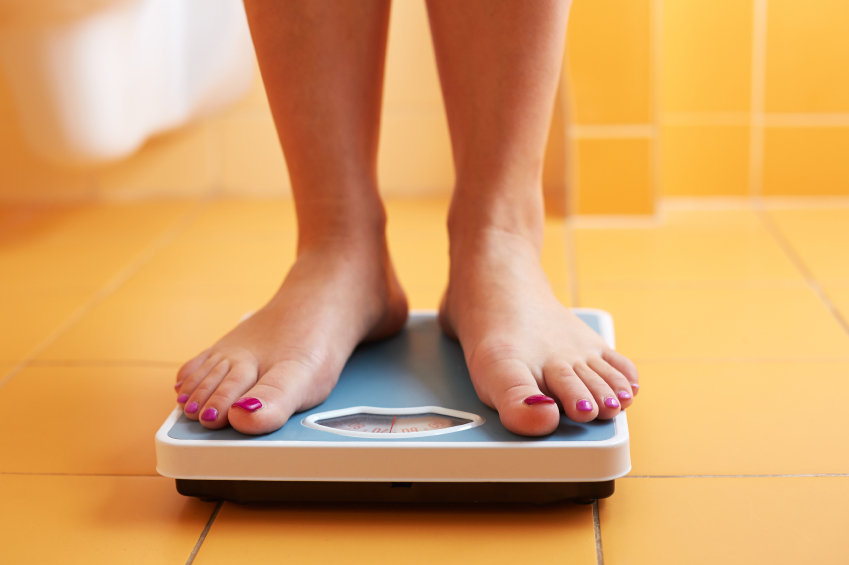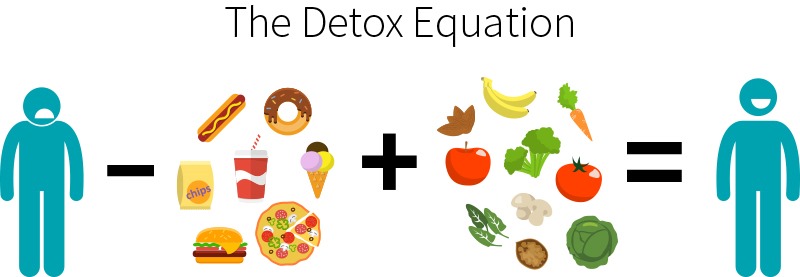How to Know Which Detox Is Right for You

If you're feeling a scrap sluggish or looking to kickstart your journey to better health, you've likely come across any number of quick-set detox or cleansing programs that hope to restore vitality.
Such programs can claim to cleanse your whole body or specific organs. They commonly consist of a highly restrictive diet, with a possible array of supplements. The Master Cleanse, for example, prescribes 6–12 glasses of lemonade with maple syrup and cayenne pepper every bit your only sustenance. According to its creator, this program promotes "the elimination of every kind of disease" and is the near successful healing diet in the world.
If y'all're thinking that "every kind of disease" is conveniently vague, you take a point. In 2009, an investigative report of 15 detox-program manufacturers found that none could provide a lucent list of the harmful substances being eliminated, and that no two even divers "detox" the same manner.
Not only are nearly commercial detox programs ambiguous, nearly none have been tested for their safety or efficacy. [1] Even the National Middle for Complementary and Integrative Health states that "in that location isn't whatsoever disarming evidence that detox or cleansing programs really remove toxins from your body or improve your health". They besides warn that "some of the products and procedures used in detox/cleansing programs may be harmful to your health" — a alarm supported past case reports on kidney damage from a greenish-smoothie cleanse [2] and liver failure from drinking too much "detox tea". [iii]
Commercial detox programs merits to eliminate harmful substances that accrue in the body, usually through highly restrictive diet protocols. Those programs, however, are largely untested for their efficacy or safety, and most can't even agree on a definition for "detox".
Does your trunk demand detoxification?
It definitely can — just not as detox companies sell it.
The Centers for Illness Command and Prevention's Bureau for Toxic Substances & Illness Registry defines detoxification as "the process of removing a poison or toxin or the effect of either from an area or individual".
Medically, you need detoxification when you poison yourself with drugs, such as alcohol.
Standard medical detoxification involves shoving 25–100 grams of activated charcoal down your pharynx every couple of hours to forbid the swallowed chemicals from being absorbed from your gut into your bloodstream. [four] [5] The charcoal binds the chemicals, allowing you to poop them out.
Only then, tin can't you lot simply have activated charcoal supplements every day "but in case"? No, you can't, or rather you lot shouldn't, because activated charcoal doesn't differentiate betwixt friends and foes: it will bind vitamins and essential minerals only as readily as it volition dangerous chemicals. [6] Moreover, the doses in those pills are well below the 25–100 grams used medically, and activated charcoal can simply bind chemicals in your intestinal tract — so not chemicals you've already absorbed, and not chemicals in your lungs.
Medical detoxification is warranted but in example of acute poisoning, and should be performed but under medical supervision.
Practice you accumulate toxins?

The short reply is yes: your body, like that of any beast, can accrue toxicants (poisons), including toxins (poisons produced past a living organism). This process is called bioaccumulation. Mercury, for case, is known to accumulate in predator fish and in people who eat those fish, [7] and even our beloved poly peptide powders may not be entirely safe, [8] according notably to Consumer Reports and the Clean Label Project.
Of detail business organisation are environmental persistent organic pollutants (POPs), a type of toxicant that accumulates in trunk fat. [9] In the curt term, your fat can protect the rest of your body from acute harmful effects such as metabolic and hormonal disruption. [x] Over fourth dimension, all the same, your fat releases POPs back into your system, causing low-level chronic exposure that has been associated with metabolic diseases. [9] [10]
Your body tin accumulate toxins and other toxicants, notably heavy metals, such as mercury, and liposoluble chemicals, such as persistent organic pollutants (POPs).
A side note on POPs and dieting
Few studies on obesity and fat loss consider the role of POPs, [11] yet POPs might help explain why weight loss doesn't improve everyone'south health every bit — in some people, the increased toxic load from POPs offsets the benefits of conveying effectually less fatty. [eleven] More precisely, an inefficient excretion of the POPs released when dieting may reduce health improvements, likewise as increase the risk of weight regain. [12]
Whether Pop redistribution results in adverse effects in humans remains to exist studied, but some information is suggestive. For example, in people whose weight loss was induced by gastric featherbed surgery, college levels of POPs in the claret was associated with lesser health improvements from weight loss. [13] Weight loss induced by regular dieting besides leads to an accelerated release of POPs from fat cells into circulation, with the increment in serum POPs being proportional to the weight loss. [14]
Fat loss appears to accelerate the release of POPs from fat cells into circulation, and more than POPs in the blood correlates with less improvement in wellness biomarkers. Withal, there is still piddling inquiry on the part of POPs in obesity and weight-loss interventions.
Detoxing done right
Your body has a born detoxification system: your lungs and other organs work around the clock to remove harmful substances. Your liver, for instance, transforms noxious chemicals into benign substances that are excreted in the urine (via the kidneys) or feces (via the gallbladder). [15]
In that location are three ways a realistic detoxification program could work:
1. Past decreasing your exposure to known toxicants
Information technology is wise to reduce your exposure to airborne pollutants such as smoke, smog, and chemic fumes. You don't always get to choose where you alive (eastward.g., rural areas tend to have less air pollution than urban areas [16]), but you can at least reduce pollution accumulation in your home through proper air conditioning and ventilation. [17] You tin can also, if you alive in a smoggy surface area, wear a face mask — how much it'll filter will depend on its design, including how well information technology fits on your face up. [18] [nineteen]
Pesticide residues in food are a valid business organization too, though it should be noted that the Pesticide Data Plan (PDP) of the United States Department of Agriculture (USDA) has consistently constitute that the vast majority of the food on the market contain either no detectable residues or residues beneath the tolerable limits set past the Ecology Protection Agency (EPA).
While the USDA does non currently test for residues of pesticides normally used on organic foods, it does test for residues of pesticides not canonical and some approved for limited application. Unsurprisingly, organic produce (notably fruit) less often have synthetic pesticide residue than conventional produce do. [20] Trials in adults and children have shown that switching from conventional to organic produce can reduce biomarkers of organophosphate-course pesticides, which are used in conventional agriculture and may be harmful, in every bit little every bit a calendar week. [21] [22] Fortunately, in the US, this class of pesticide has consistently dropped from use in favor of less acutely toxic ones since 2000.
When institute, pesticide residues were similarly low in organic and conventional produce, but there is some evidence that fifty-fifty very low doses of pesticides might still elicit physiological effects. [23] These effects, be they beneficial, neutral, or harmful, and exist they from organic or conventional pesticides, are not well studied. So, what is a consumer to exercise? The practical solution is quite uncomplicated: rinsing, peeling when possible, and cooking can reduce the corporeality of pesticide left on your produce, whether this produce is organic or non. [24] [25]
(Alas, organic products are non unilaterally safer than conventional ones: a 2018 test of protein powders revealed that organic ones had nigh half the amount of BPA (an industrial chemic) but twice the amount of heavy metals.)
2. By improving your liver's power to metabolize toxicants
Current testify suggests that some compounds in found foods can upregulate your liver'southward detoxification process and antioxidant activity. [26] [27] 1 such compound is the sulforaphane in broccoli and other cruciferous vegetables, equally was shown in humans [28] as well equally in rats. [29]
Of the many supplements marketed for liver health, four are supported by stiff evidence from human studies: milk thistle, NAC, Same, and TUDCA.
3. By enhancing your body'southward ability to excrete toxicants
Fiber, especially soluble and/or fermentable, can enhance detoxification both directly and indirectly. Directly, by binding bile and its associated toxins, thus facilitating their excretion. Indirectly, by feeding the bacteria in your digestive tract, some of which create short-chain fatty acids and other metabolites that act on the liver and kidneys to increase their power to excrete toxicants. [30] [31]
Sweating may help excrete heavy metals, [32] but sauna studies are deficient and rely generally on subjective assessments, such equally questionnaires nigh quality of life, rather than on objective measures of poison brunt or excretion. [33]
As for the notion that a juice-only cleanse can shift your guts away from digestion and toward the excretion of toxicants — information technology is one of those catchy ideas that lack scientific backing. If y'all want your organs to exercise their best, including to rid you of toxicants, and so yous should not deprive them from the nutrients they demand to function. That means that, rather than the occasional cleanse, what you need is a daily diet rich in varied fruits and vegetables.
Toxicants, notably heavy metals and liposoluble chemicals, tin accumulate in your body. Avoid them whenever possible. You lot tin can support your inborn detoxification system by eating a diet rich in fruits and vegetables (preferably organic ones, which have less known harmful pesticide residual) and possibly by sweating. Some supplements, such as NAC, can likewise assist.
Nutrition misinformation is everywhere. Nosotros fight it.
Enter your email address to receive a free mini-grade on supplements.
Like this article, our mini-course is unbiased and 100% backed by science: y'all'll learn what really works — and what's a waste matter of time and money. Our course volition help you deal with the misinformation out at that place, thus giving you a better risk to achieve your health goals!
100% backed by science. Nosotros accept an contained, unbiased approach to figure out what works (and what'southward a waste material of fourth dimension and money).
Arm yourself with the cognition you need to make the right decisions about your wellness.
Do commercial detoxes work?
A 2011 survey reported that 92% of naturopaths prescribed detoxification therapies, commonly every bit treatments for environmental exposure to toxicants. Said therapies consisted mainly in eating more "cleansing foods," such every bit Brassica vegetables; eating more fruits and vegetables in general; opting for organic foods; supplementing with vitamins, minerals, and fibers; and minimizing environmental exposure to toxicants. More questionable treatments, such as homeopathy, were less mutual. [34]
Just what virtually commercial detox programs, or "cleanses"? Studies on those are deficient and, according to a review from 2015, not very disarming, as they suffer from small sample sizes, sampling bias, lack of control groups, reliance on self-report, and qualitative assessments rather than quantitative measurements. [1] A more recent study shared these limitations: with no command grouping, information technology showed that post-obit a detox program centered around eating a whole-nutrient diet improved self-reported health. [35]
The one randomized controlled trial (RCT) we could locate separated center-aged women into iii groups: Master Cleanse (MC), placebo, and control. The control group kept eating every bit usual, whereas the MC and placebo groups ate only 400 Calories per day. As a result, both the MC and placebo groups lost weight and showed related health improvements, with no difference between groups. [36] In brusk, the "magic" was found to be in the caloric restriction but, non in the combination of lemon juice and Neera syrup (a blend of maple and palm-tree syrups designed to have high amounts of minerals and trace elements).
Finally, the 1 RCT on a commercial detox supplement without caloric brake reported that this supplement didn't have much of an effect on annihilation. [37]
What trivial evidence at that place is on "cleanses" (commercial detox diets) is fraught with methodological problems. Cleanses' brusque-term benefits (weight loss and related health improvements) seem to exist mostly attributable to caloric restriction and placebo furnishings, not to special detoxification effects.
Explaining why it feels similar detoxes work

Why do fad cleanses spread through word of mouth and then chop-chop? The answer is threefold: rapid weight loss, removal of problematic foods, and the placebo effect. This could be corking … if weight loss ever meant fatty loss.
If you slash your caloric intake, you probably slash your carbohydrate intake, and if you lot slash your carbohydrate intake, yous don't furnish your glycogen stores. Non only practice y'all lose your stored glycogen, just you lose the associated h2o. To store one gram of glycogen, y'all need about 3 grams of water. [38] [39] The average homo carries 341–593 grams of glycogen in his liver and muscles, and so about 1,364–2,372 grams (3–5 pounds) of glycogen+water.
Therefore, by depleting your glycogen stores, you can lose several pounds in a couple of days. [40] And of course, less nutrient consumed also ways less nutrient (and its associated weight) moving through your intestines.
The result? Spectacular weight loss — in the short term. But cleanses are short term, and then people never go to see them fail. All they run across is the spectacular weight loss; they feel better because of it, and they attribute both their weight loss and perceived better health to their cleanse. And they still practise when they resume eating ordinarily and most of the weight they lost (all the weight from glycogen+h2o and food-in-transit) comes rushing back.
The short-term weight loss from a cleanse can be spectacular, just most of what is lost is glycogen and water, which come rushing back when normal eating habits are resumed.
So when people feel amend from a cleanse, is it simply a placebo effect? Not always. People who undergo a cleanse might also feel improve because they terminate consuming foods that don't agree with them. In other words, cleanses work as de facto elimination diets.
An elimination diet is a diet that removes a food or category of foods that you suspect might negatively touch your health. Some people, for example, will cease consuming milk (or all dairy products) to encounter if, later on a few weeks, they experience ameliorate. Sometimes, people remove many foods at in one case; and so, after a few weeks, if they feel better, they start adding the foods dorsum, one by ane, to determine which ones are problematic.
Bottom line

Toxicants, notably heavy metals and liposoluble chemicals, can accumulate in your body. Avert them whenever possible. A diet rich in protein, vegetables, and fruits will provide your organs with the nutrients they need to function optimally, and some supplements may support your liver specifically. Sweating may also help you excrete heavy metals.
As sold to the public, cleanses (detox diets) do not work. Nearly of their benefits — notably a rapid, simply mostly brusk-term, weight loss — tin be attributed to the desperate caloric restriction, not to detoxification. A cleanse might also help by removing foods that don't agree with you (they piece of work as a de facto elimination diets).
In example of acute poisoning by a poisonous substance, get to the infirmary.
While "detox diets" are ameliorate avoided, some supplements can back up liver wellness. Check out our Liver Health Supplement Guide to learn which supplements are backed by the show and which are dangerous or simply a waste matter of money. You lot'll besides discover practical, specific information on dosages, combinations, etc.
lococomaystionite.blogspot.com
Source: https://examine.com/nutrition/do-you-need-to-detox/
0 Response to "How to Know Which Detox Is Right for You"
Post a Comment